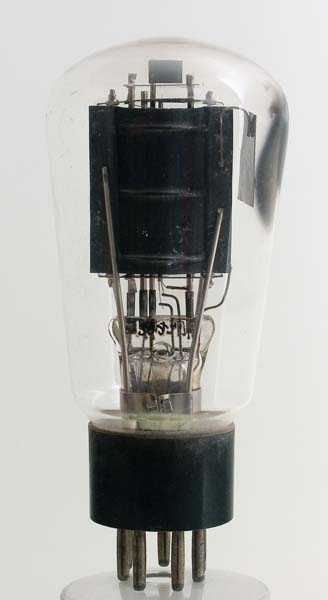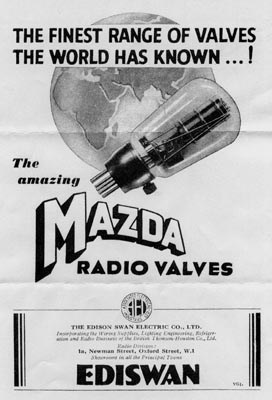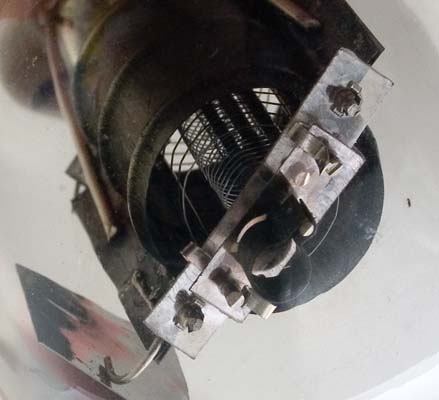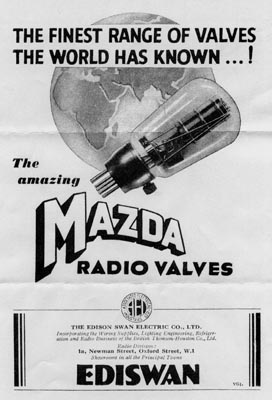|
AC/PenSensibly equivalent¶ to:See also:
|
|
|

|
The Mazda AC/Pen, introduced in 1930, was the first technically successful indirectly-heated power pentode capable of enough output to drive a moving-coil loudspeaker at good volume. Originally released with a B5 base cap, in 1933 it was also made available with the then brand new B7 base as shown in this exhibit.
The balloon envelope contains a blackened cylindrical anode with clearly visible grids. The electrodes are held in, or clamped to, a glass pinch, from which wires will run to the base pins.
The arrangement of the concentric wire grids is easily seen as is the control grid cooling fin.Moving-coil loudspeakers (invented in 1926) gave much better sound quality than the horn or moving-iron loudspeakers used previously but initially they had rather low sensitivity due to the difficulty of mass-producing really good, light, magnets at low cost.Two or three Watts of undistorted audio power was therefore required to drive a moving coil loudspeaker. Larger directly-heated triodes such as the PX4 could readily provide this but at low gain and low efficiency, requiring an extra stage of amplification and wasting costly anode power. Large directly-heated pentodes such as the PT4 gave improved gain and efficiency but direct AC heating of the filament (ie. in a mains-powered set) tended to cause objectionable levels of audible mains hum due to the increased final-stage gain.The requirement for a powerful indirectly-heated pentode was obvious but early attempts to make such valves resulted in overheating of the inner electrodes due to the combination of heater, screen grid and anode power within a very confined space.The Mazda AC/Pen was the Landmark valve whose design overcame these difficulties at low cost and without causing other problems.
The relatively low heater power (4 W) and the generous anode diameter contributed to its success. The above advertisement uses the AC/PEN as its example of quality. Many original AC/PEN's survive in good working order.This exhibit is a later example with a B7 base and a blackened anode for better cooling. The AC/Pen became a UK industry standard and was widely copied under a variety of names.The AC/Pen may be found listed under: AC/PEN; ACPen; AC/Pen/5; ACPEN/7, and all possible permutations of these.The balloon envelope is 58 mm in diameter and excluding the B5 base pins, is 112 mm tall.References: Data-sheet & 1043. Type AC/Pen was first introduced in 1930. See also 1930 adverts. |
Pin Connections
| 1 | 2 | 3 | 4 | 5 | 6 | 7 |  nc | g1 | g2 | h | h | k,g3 | a |
|
|
Absolute Maximum Operating Conditions¶
| Vh | Ah | Va | Vs | Vg | mAa | mAs | ra | gm | Pout | D | 
| 4.0 | 1.0 | 250 | 250 | -15.5 | 32 | 6 | 75k | 2.7 | 3.3W | 7% |
|
PDF scanned from an original document held by the museum |
Updated June 11, 2022.
|
|